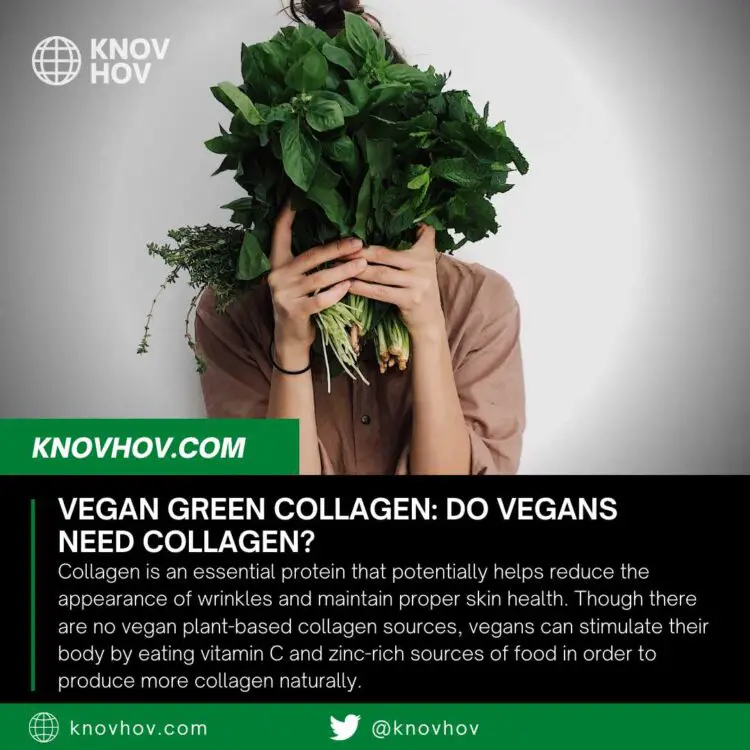Vegan Green Collagen: Do Vegans Need Collagen?

What is Vegan Green Collagen?
According to the most recent study on vegan green collagen, genetically engineered yeast and bacteria can be used to make collagen. However, this vegan collagen may not have the same effect on the body as real collagen. Furthermore, chemically produced collagen may have adverse effects, and study is currently ongoing. Vegans, therefore, require collagen-boosting foods in their diet.
How to boost collagen production within the body
Raw vegan collagen boost reviews and investigations are highly suggesting the products and supplements that are increasing collagen synthesis within the body instead of artificially manufactured vegan green collagen. These plant-based collagen builders are more beneficial since they contain a variety of vitamins, minerals, plant extracts, and herbs, including vitamin C and zinc, which the body needs to create collagen.
Role of Collagen within Human Body
Collagen is a naturally occurring substance that plays a vital role in our bodies. Our connective tissues, joints, intestines, and skin all contain collagen. The natural synthesis of collagen in our bodies declines as we grow older. Since your early twenties, your body has been producing less collagen as you get older. As a result, when you become older, wrinkles emerge.
Can vegans have collagen in vegetarian food?
Do vegans get collagen? No. Collagen isn’t found in vegetarian foods, and there isn’t a plant-based vegan green collagen supplement that can be taken externally. Collagen can only be obtained from external sources, such as animal-based foods. But the greatest part is that collagen is an important protein generated by the human body, and vegans may increase their collagen synthesis by eating plant-based vegan foods.
Why do vegans need collagen?
Do vegans need collagen? Yes. Collagen is an important protein that may aid in the reduction of wrinkles and the maintenance of good skin health. Though there are no vegan plant-based collagen sources, vegans can encourage their bodies to make more collagen naturally by consuming vitamin C and zinc-rich foods. This is good for skin health as well as joint and digestive health.
Collagen in Animals
Collagen can only be obtained from animals. The most common sources of collagen consumed by individuals are marine collagen and bovine collagen. Collagen is a protein found mostly in parts of animals that we don’t eat in our contemporary diets, such as cartilage, bones, and skin.
What is marine collagen?
Marine collagen is a protein takes from the skins of fish. Fish skins that are getting away from food production processes are hydrolyzed by acid and a food-grade enzyme to make marine collagen powder that can use as a supplement for skin care and health.
What is bovine collagen?
Bovine collagen is made from the bones of cows. Cow bones and other cattle byproducts are boiled in water and the collagen is extracted. Then it is dried and powdered in order to make the supplement for skincare and health.
Vegetarian food rich in collagen production within the body
- Citrus Fruits – Oranges, Lemons, and Limes
- Tomatoes
- Berries – Strawberries, Blackberries, Raspberries, and Blueberries
- Green leaves – Spinach, Kale, Collard greens
- Legumes
- Red bell peppers
Citrus Fruits – Oranges, Lemons, and Limes
Citrus collagen is the most common type of collagen suited for vegetarians, as it is derived from citrus fruits and has a significant impact on the body’s vegan collagen synthesis. Citrus collagen is vegan friendly, and citrus fruits, such as oranges, lemons, and limes, are abundant in vitamin C, which contributes significantly to the creation of vegan green collagen.
Tomatoes
Tomatoes are a fantastic source of food that helps the body produce vegan collagen. Tomatoes are abundant in vitamin C and the antioxidant lycopene, which protects the skin from UV damage and aids in the creation of collagen. Sun-dried tomatoes will enhance efficiency and outcomes.
Berries – Strawberries, Blackberries, Raspberries, and Blueberries
Strawberries, blackberries, raspberries, blueberries, and all kinds of berries contain high doses of vitamin c which contributes higher for the vegan collagen production within the body. Apart from collagen production, berries also contribute to fights against UV ray damage to the skin.
Green leaves – Spinach, Kale, Collard greens
Green leaves such as spinach, kale, and collard greens are commonly used in plant-based diets to enhance vegan collagen synthesis in the body. Almost all of the greens we eat include vitamin C as well as all of the minerals required for collagen synthesis. The chlorophyll in green leaves may help to raise collagen levels in the body.
Legumes
Legumes, which are one of the most popular collagen plant-based diets, can help vegans produce more collagen in their bodies. Legumes are one of the greatest sources of minerals and proteins that the body needs. Zinc in legumes is important for collagen synthesis, in addition to providing essential proteins.
Red bell peppers
Vitamin C is an important component for collagen synthesis in the body, and the collagen-boosting impact of red bell pepper is enhanced by its high vitamin C content.
Do vegans need collagen supplements?
You won’t have to worry about collagen deficiency if you eat a balanced diet rich in vitamin C and zinc. Collagen is produced naturally in the human body, therefore using collagen supplements to enhance collagen synthesis is unnecessary if you eat a balanced diet.
HIGHLIGHTS
Vegan Green Collagen: Do Vegans Need Collagen?
- Collagen is the most prevalent protein in animals, and it has been scientifically proved that collagen offers potential health advantages for the skin, muscles, and bones, as well as the cardiovascular system. That is why vegans require collagen as well.
- Vegans who do not consume animal products cannot obtain collagen from food sources externally; instead, they must consume nutritious food sources to increase vegan collagen production within the body.
- Although vegan collagen produced from bio-designed microbes is on the market, it is still in the research stage, and its use has not yet extended beyond the medical community.
- As a result, the ideal option for Vegans is to optimize their diet in order to enhance their body’s collagen production.

